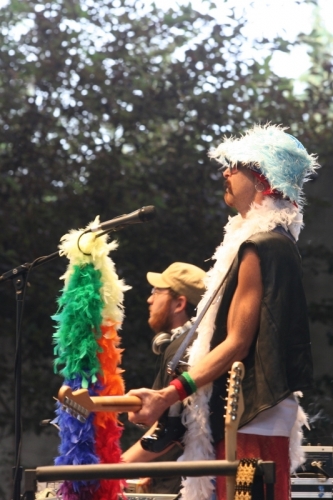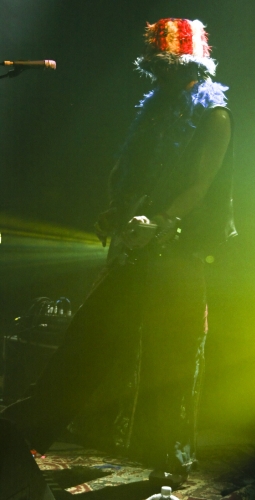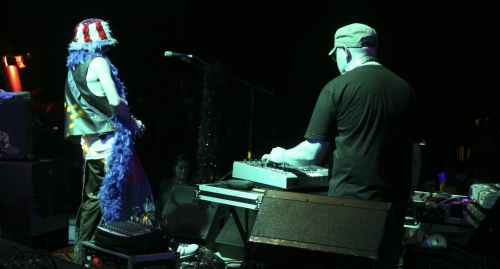Boombox is:
Zion Rock Godchaux
Russ Randolph
Interview by: Chris Robie
 HGMN: So how did you guys meet?
HGMN: So how did you guys meet?
Russ: We met about five years ago working on a record that Z's mom put together. It was a family project, something like that. Z was living out in San Fran and moved out to Muscle Shoals, AL. where his mom lives. They brought me in to record and engineer the album. Throughout the course of the album, just hanging out and working in the studio together for about five or six months it ended up developing into a situation where you enjoy working together. Together we felt that we had a pretty good grasp of what was going on and the direction we wanted to go.
Zion: I had gone out to Alabama to record the record with my mom and record my own record and get it out to Europe. That was the plan. At least record a good demo and take it to Europe, ya know.HGMN: Why take it to Europe?
Zion: Just because I've been to Europe before. I love it over there. Everyday is just a crazy, new and amazing experience. They're a lot hipper to electronic music over there. So, Europe for me was a no-brainer. That's where I was at when I went out to Alabama. Meeting Russ, we kind of realized that the two of us can cover a lot of the bases, the bases needed to really blow up clubs with just two people with minimal amount of mics and you know, crazy shit. Keep it simple and really be able to be free, have the whole thing set up to where we're free to improvise the whole time, but it still be thumpin' and all that. Over the course of making the record we kind of fell upon some revelations (laughs) and realized that we can make it happen, make it work. It started out us throwing parties, DJ'ing free parties in the park...
HGMN: Was this in Alabama?
Zion: Yeah.
HGMN: Is there an electronic scene in Alabama?
Zion: No.
Russ: We are the electronic scene in Muscle Shoals.
Zion: There would be like four people at our outdoor parties (laughs).
Russ: Yeah. It would be like us and our friends, our girlfriends, whatever the case was...like twenty people just hanging out.
Zion: We would be bumpin' house music right out there on the water.
Russ: We live around the Tennessee river so we could just rent out a pavilion near the water and throw parties.
Zion: We started incorporating our own tracks with drum machines and turn tables at the parties and from there we fazed out of spinning other people's music and started producing and performing our own. Having the dichotomy of the electronic beats - sequence, rhythm, pulsatingness of it all mixed with live instrumentation and real songs and the other side of the spectrum, some good ol' rock n' roll. We were able to fuse all that and get that big sound we were looking for.
Russ: When we first got together we were both frustrated. We had both been in numerous bands. We were tired of dealing with four, five, or six people. Trying to coordinate that many people in to one project is...
Zion: It's nearly impossible.
Russ: Yeah. In this day and age it's not working smart. Once we realized that we could really make something of this we spent a year just methodically planning out exactly what we wanted to do. We wanted to combine that world, the Beat world with the Rock world.
Zion: It's like, we wanted to take House music to the rock n' roll people and let them know, "Hey, you can't just throw the baby out with the bath water". On the other side of the coin, I take the guitar, real songs and singing to the beat minded electronic heads and let them know, "Hey, it ain't all just mixing two records." That's great and everything but live instrumentation and stuff shouldn't be thrown out either. The two could be fused properly. And if so...there's something there. It's just knowing ways how to fuse the two.HGMN: What does your instrumentation consist of?
Russ: We've got two drum machines. Basically, the heart of my world is those two drum machines and mixing between those two the way a DJ would do turntables. If a DJ has got two turntables he's mixing one song, it already has a beginning and an end, certain set duration time. You're just mixing between the two. In my world I've got the two drum machines and each of them can be playing a song, and I can blend elements to each one together. So I'm kind of weaving the song in to a kind of fabric. We're not locked in the way a DJ would be. We're not locked into song structure, a song arrangement or tempo and anything like that. We're pretty free to explore live.
HGMN: So you're able to do a lot of improvisation?
Russ: Yeah. We want to have that improv kind of wrapped around the idea of a song. So, there is song structure but within those confinements we're still free to explore. The beat part of that comes from drum machines. I've got a turntable and some synths, like noise makers and stuff like that.
Zion: The rhythm is the foundation, the heartbeat of what we do. What we're looking for is to essentially get the crowd under some sort of hypnotic groove. With a live band, unless you're Marley & the Wailers, it's really tough to get inside the groove to where you can actually grab hold of all four corners of the room and everything. It's real hard. That's why the drum machines are there. That's what sets our...
Russ: It really creates our reference point.
Zion: Yeah.
Russ: A band can build energy and break. It can go through that song & dance. They can't get to a point where a DJ can all from a fixed reference point. With a fixed reference point everything else is moving around this point. You have the potential for a lot more momentum which is different.
Zion: Yeah. It's just a different animal completely.HGMN: So You play the guitar and do vocals?
Zion: Yeah. I've got some synthesizers stuff that I use. I grew up DJ'ing as well so I've got a good perspective of what Russ is doing just like Russ has a good idea of what I'm doing because he's a musician that plays drums. So really we kind of share a brain and always try to stay sympathetic to the audience first and foremost. We're not really out there to get the audience to dig what we have to play for them. It's more like we don't know what we're going to play for them and we find that out during the course of the night, depending on the energy we get from the crowd.
HGMN: So you don't use a setlist?

Zion: No
Russ: We don't use a setlist. The most we ever do is talk about, this is actually on stage as we go play, is the first song. What are we going to start with.
Zion: What's our starting point.
Russ: I think another thing that sets us apart from other bands, if you have a band that has a predetermined setlist you're already charting out the way your night is going to go. You're crowd has to get on board...
Zion: They have to get on board your train. We get on the people's train.
Russ: Depending on what we're doing, we can keep going this way, or if they need something else or if they're in a different mind set...Some towns are funky. They need other kinds of things. We have to play...
Zion: Different times at night.
Russ: Early set, late set. The tempo's are different. The songs/choices are way different depending on what time of the night we're playing.
Zion: Type of party.
Russ: If people have seen us before or not, that kind of thing. Not doing a setlist, it's very easy for us to just move and not stop.
Zion: As a DJ would. We're not a Jam Band. We're an electronic act that approaches the dance floor like a DJ would approach the dance floor.
Russ: We're two people. We can pretty much turn on a dime. If you have four or five guys that momentum is like a train.
Zion: To be able to do anything real dynamic and stuff you kind of have to reverse that shit. Me and Russ can play dynamically without having to reverse it because it's just our thought patterns bouncing off each other.HGMN: Do you guys approach the studio the same way?
Russ: We're working on our new record right now. It's going to be released in the spring. This is the first time that we've actually gone in to make a record. Traditionally when we work on tracks we work it the way we are live.
HGMN: Is that how you did "Visions of Backbeat"?
Russ: Visions was basically recorded like a live show. We would go back and kind of chop things up...
HGMN: Were they songs picked from live shows?
Zion: No. Those were early tracks. We still had never played live.
Russ: This time we're going to try some different things like where we have a concept direction we want to go where we both create material. Kind of like building the Arch of St. Louis, starting from two sides and kind of meeting in the middle and seeing what happens. Things like that, trying new ways to create material. We want to record this stuff in front of a crowd. We want to capture the live energy of a show. We do multi track everything. We can go back and mix all our shows.
Zion: The tracks are like Visions, it's dance music, like a DJ spinning at a party.HGMN: Will it be "chill" like Visions or will it be more "dancey"?
Russ: I think the new album will be a lot more aggressive.
Zion: It will be harder.
Russ: We're going to push this album to be played a little later at night.
Zion: Yeah.
Russ: Visions, I think, can be played at anytime. It is more chill, a little more down tempo. I think the new album will be faster.
Zion: It's going to have a little more electricity in it. We still want it to be able to be listened to when you're going to bed. For me any good album, you can wake up and listen to, go to bed and listen to, full time party 2am listen to...It works all the way around.
Russ: When I say aggressive I don't mean hard edge. We're out for a specific kind of thing. We want to make a specific kind of dance record. People will make electronic records that people will never listen to before midnight. You have to have a head full of good drugs to appreciate it. We're trying to make a record that can still be appreciated for what it is on the surface anytime of the day.
 Zion: With any age group.
Zion: With any age group.
HGMN: You mean traditional songwriting fused with electronica?
Zion: Yeah. The thing with Boombox is that there's no rules with us. Anything can happen. We're not limited to any type of style. We're just playing American music regurgitated out of this boombox and it could be anything. It's essentially like if you were to flip through the stations of a boombox. It's open like that. We're open to all influences and possibilities. I mean it's got to be swingin', it's got to be hittin' but besides that...
Russ: Obviously, we're house influenced. We love that big beat, driving dance thing, but we want to create a machine that's open to anything, to go any direction we want it to. We want to build an arsenal so that when we come out to rock a party, at anytime of the day, we can still connect with people.
HGMN: Do you have a title for the album yet?
Russ: Yes. It's going to be called, Downriverelectric.
Zion: No.
Russ: We play a lot of material that's not on our album but this new one will be completely new material. No one has ever heard it.
Zion: Visions has like seven tracks on it. Right now we've got, I don't know how many...But on the next record we want it to be just fresh stuff. The easy way would be to record the tracks that...
Russ: That's already been road tested.
Zion: We've got like thirty tracks to choose from we could record and make the new record, but I think we're just going to move past that and make new shit.
Russ: We still play live all the time. We never really take time off. We'll take some time off closer to the end of the year to kind of finish up mixing and that kind of stuff. We literally travel and tour all the time. Hopefully, we can still record these in front of an audience. That's the goal.HGMN: When we received 'Visions of Backbeat' back at the office a couple of years ago, after reading your press kit, there seemed to be a lot of emphasis on the fact that you are Keith and Donna Jean Godchaux's son. After hearing that I already had it in my mind what the album was going to sound like. I was really surprised after listening to it how wrong and way off, I was. How did you get turned on to the electronic scene? Were you ever in to the Jam band scene at all?
Zion: For me, the day Garcia died, I pretty much...I was living in San Francisco and there was about a week right after he died of just limbo, not really knowing which direction I was going to go. I really didn't...nothing against Phish...
HGMN: We're you a musician at that time?
Zion: Yeah. I grew up playing instruments my whole life, and I've been in bands and all that. I knew I wasn't going to be able to go back in to that "lot" scene without Garcia, ya know. It just wasn't happening. Didn't want to hear about and didn't want to know about it. Then my buddy Steve dragged me out to a rave one night in San Fran. He's like, "You'll dig it dude. This is where it is at."
HGMN: What Year was this?
Zion: Winter of 95'. What I saw those nights when Steve brought me out was kind of like the next generation of psychedelic explorers who didn't necessarily dance to a band but were dancing to a DJ in the back of a room with a huge sound system. The energy that can get cookin' in there was more the transcendental hypnotic approach, rhythmically, that I was looking for. Here it is, now all we gotta do is slap in a guitar, use this as a format to direct the songs and make the music and all that. And doing that we're not going to need a whole band. So that was my introduction to the scene. And since then I haven't really gone back in to the festival, Jam world. For me, I'm a Garcia guy. If I'm going to listen to any of that shit I'll listen to the Dead...The Grateful Dead. That's just the way that it is for me. We really kind of new that there was going to be a certain amount of feedback of, "It's Keith and Donna's kid." That would be like the main push. Me and Russ, we knew what we were doing and where we were going. We really didn't need any help. We didn't want to ride any coat tails. We're big boys here. We've got our own vision. We're going to make this happen Grateful Dead or no Grateful Dead. The only thing that the Grateful Dead really has to do with it is the inspirations it has given me growing up. It's in me. We really try to shy away from plugging that fact. Ultimately, we want people to get down to Boombox - Be hip to it, dig it and then as a side note, whatever, find out who my parents were. I'm not going to lie, a lot of the gigs that we got were because of where I come from , the whole Dead connection. "Yeah, let's get these guys in to open..." You can knock on doors and somebody will let you in, but you still got to prove that you belong in the building. That whole trip of getting somewhere because of somebody else, that's only going to last you a second.


